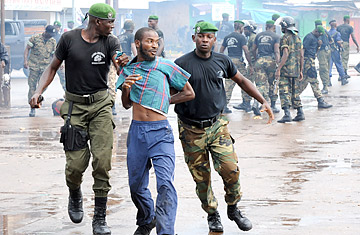
Guinean police arrest a man in the capital city of Conakry during a protest that was banned by Guinea's ruling junta on Sept. 28, 2009
Correction Appended: September 30, 2009
When Captain Moussa Dadis Camara took control of Guinea last December in a bloodless coup, tens of thousands of cheering supporters thronged the streets of the capital, Conakry, shouting: "Welcome to this change! Welcome to this change!" What a difference 10 months can make.
The capital was a scene of chaos on Sept. 28, when soldiers opened fire on crowds of unarmed civilians at a pro-democracy rally in a stadium, according to witnesses and news reports. Dozens of people were killed and hundreds were wounded, Isabelle Bourges, a spokeswoman for the International Committee of the Red Cross, tells TIME. According to New York–based Human Rights Watch, bodies were also found with knife and bayonet wounds and witnesses saw women being stripped naked in the streets and sexually assaulted by security forces.
"They didn't even ask us to disperse. They just started shooting!" protester Bambaya Bari told TIME by telephone from Conakry.
The crackdown in the West African country was immediately condemned by the African Union, the European Union and human-rights organizations around the world. "The killing of dozens of unarmed protesters is shocking even by the abusive standards of Guinea's coup government," says Corinne Dufka, a senior West Africa researcher at Human Rights Watch. "Guinea's leaders should order an immediate end to attacks on demonstrators and bring to justice those responsible for the bloodshed."
Tensions had been building in the weeks leading up to Monday's protest after Camara hinted that he may run in the presidential election set for January 2010, going back on an earlier pledge not to take part in the election. The move infuriated the opposition, which wants to see free, democratic elections held in the country. Many opposition members were arrested in Monday's crackdown, according to Mohammed Jalloh, a Guinea expert at the think tank Crisis Group in Dakar, Senegal.
"There was a dialogue about how the transition to civilian rule should be accomplished," says Jalloh, who recently returned from a mission to Guinea. "But Camara blocked it ... and now the street is the only alternative for expressing discontent."
Camara had once been seen as a beacon of hope for the resource-rich country, one of the poorest in the world. When he took power following the death of autocratic President Lansana Conte, who had ruled for 24 years, Camara promised to hold elections to bring about civilian rule within a year. Many Guineans were also optimistic that Camara could stop the rampant looting of the country's coffers by government officials. In 2008, Guinea was ranked 173rd out of 180 countries in a corruption index by Transparency International, a corruption watchdog.
Camara initially looked like he was serious about cleaning up the country. He became the host of a popular television program in which he grilled former Conte cronies about their role in cocaine-smuggling operations in Guinea — under Conte, the country had become a stopover for cocaine shipments from Latin America to Europe. But Camara's heavy-handed approach soon turned off most of the country's non-military politicians and trade-union members. Ordinary Guineans, who had once been enthralled by his vociferous television appearances, over the past few weeks started demanding a change of power in several anti-government demonstrations. About 60,000 people gathered at Conakry's airport earlier this month to greet opposition leader Cellou Dalein Diallo, expected to be one of the top candidates in next year's presidential election, when he returned from a trip overseas.
Now residents in Conakry remain locked in their homes, afraid to venture out into the streets. Jalloh says this could be the start of a massive government campaign against pro-democracy elements in the country. "This [scene] will repeat itself in the provinces," he says. "The situation will deteriorate as long as a new dialogue is not established." For Guineans weary of being ruled by dictators, the promise of life in a free democracy may yet be a far-fetched dream.
The original version of this story has been amended. It now only attributes the death toll to the Red Cross spokeswoman.
